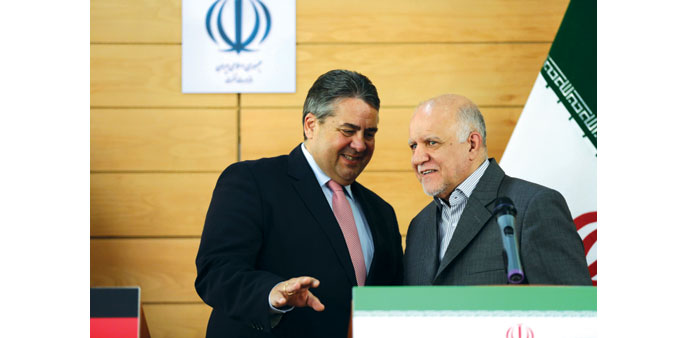German Economy and Energy Minister Sigmar Gabriel (left) speaks with Iranian Oil Minister Bijan Namdar Zangeneh during a press conference in Tehran yesterday. Gabriel, making the first top level German government visit to Tehran in 13 years, indicated that a ministerial-level meeting of a long dormant German-Iran economic commission would take place early next year in Tehran.
Reuters
Tehran
Germany and Iran moved tentatively yesterday towards reviving a once close trade relationship, anticipating the lifting of western economic sanctions against Tehran following a landmark nuclear deal.
Economy Minister Sigmar Gabriel, making the first top level German government visit to Tehran in 13 years, indicated that a ministerial-level meeting of a long dormant German-Iran economic commission would take place early next year in Tehran.
Gabriel signalled the move at a meeting with Iranian Oil Minister Bijan Namdar Zangeneh during the visit, which is also the first to the country by a senior member of a Western government since the nuclear agreement last week.
Gabriel is travelling with a delegation of German industry representatives, who are keen to move back into the Iranian market, particularly the lucrative energy sector.
German exports to Iran hit €4.4bn in 2005 but then slumped to €1.8bn by 2013 as the West tightened the sanctions imposed over Iran’s nuclear programme. However, the agreement between Iran and six world powers including Germany has opened the prospect that the sanctions will be removed.
Iran once produced more oil than Saudi Arabia and was able to extract more than 6mn barrels per day in the 1970s, but its output has fallen below 4mn bpd over the past decade due to the sanctions and under-investment. “There is no country in the world where petrochemicals are so easy to access and so inexpensive,” Zangeneh said. “I hope that German and Iranian firms can find each other.”
For decades, Germany was Iran’s biggest trading partner in Europe. Last year, German exports to Iran rose to €2.4bn in anticipation that the sanctions might be eased, but German industry associations have said they could quadruple to €10bn within a few years. German machinery, auto, chemicals, healthcare and renewable energy firms are likely to be the biggest beneficiaries of an opening up of the Iranian market.
Wolfgang Buechele, chief executive of German industrial gases group Linde, saw the greatest demand in the oil and gas sector. “Especially German plant and mechanical engineers could benefit from it,” Buechele told German magazine Der Spiegel, noting that German consumer goods manufacturers could benefit in a later stage.
The trip is a delicate one for Gabriel, in part because of Germany’s close ties to Israel, Iran’s sworn enemy.
Israel opposed the deal struck on Tuesday, under which sanctions imposed by the US, European Union and UN will be lifted in exchange for Iran agreeing long-term curbs on a nuclear programme.
Gabriel said in Tehran on Sunday that closer economic ties with Iran depended on it improving relations with Israel. He also told his hosts that Germany and other western countries expected Iran to assume “new responsibilities” following the nuclear deal, including taking on a bigger role in promoting the peaceful resolution of conflicts, in particular in Syria.

